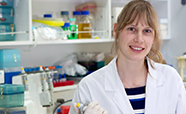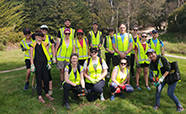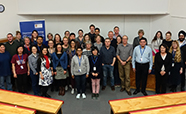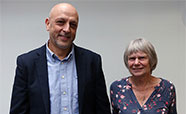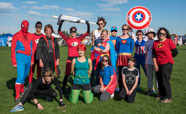Search through our archive of older news stories featuring members of the Department of Pathology and Biomedical Science.
Archive 2013–2016
2016
December 2016
PhD student wins PSOC's Best Exit Seminar Award
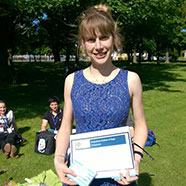
PhD student Vanessa Lattimore
PhD student Vanessa Lattimore from the Mackenzie Cancer Research Group has won the 2016 PSOC Best Exit Seminar award.
The Postgraduate Student Otago (Christchurch) association assembles a panel of UOC research staff each yearto judge which student gave the best seminar at the UOC Research Seminar Series upon or nearing completion of their PhD.
Vanessa gave her seminar in August on genetic variation and mRNA splicing in familial breast cancer genes.
Pathology inter-campus meeting held in Christchurch
The Department hosted the Departments of Pathology from both Dunedin and Wellington on 8 December funded by the Otago Medical School intercampus collaborative teaching initiative.
The meeting resulted in the continuing harmonisation of the Advanced Learning in Medicine (ALM) curriculum between Otago Medical School's departments of Pathology. Discussions included teaching strategies, e-learning resources and the continuing improvements of the course.
The meeting was attended by all 3 Heads of Departments of Pathology as well as the Course Conveners of many of the sub-disciplines.
UOC Christmas Hat Competition
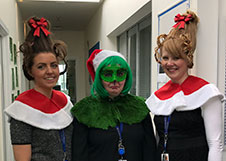
The Administration Team
The Department of Pathology dominated the number of prizewinners and overall entrants at the first UOC Christmas Hat competition held at the school-wide afternoon tea hosted by the Dean, Professor David Murdoch.
Our Pathology Administration Team won the Best Team Award for their Grinch who stole Christmas with Cindy Lou Who times two entry.
Professor Margreet Vissers won the Most Quirky Hat Award and Dr Abel Ang won the Most Environmentally Friendly Award.
Finalists from the department included Dr Alexander Peskin in the Most Environmentally Friendly category, Associate Professor Gabi Dachs in the Lab Rat category and HOD Professor Martin Kennedy in the Least Effort category.
November 2016
Second departmental symposium a success
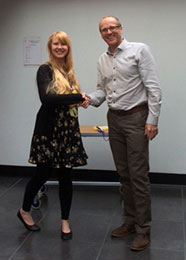
Alice Milnes and Prof Martin Kennedy
The Department of Pathology held another successful symposium on 17-18 November in the Beaven Lecture Theatre.
Teaching Administrator Alice Milnes was surprised when she won the Best Talk Award at the second Department of Pathology Symposium this month.
“I was shocked when my name was announced. Everyone else is so much more experienced at presenting than I am. I've managed to avoid public speaking since I was in the fourth form so I was really nervous to be speaking in a lecture theatre”.
Alice's talk was entitled, What we do in the shadows and she explained the department's MB ChB Vertical Module teaching programme.
Dr Rufus Turner from the Centre for Free Radical Research received the Runner-Up Best Talk Award for his talk on The power of numbers.
All presenters are given 10 minutes to speak on any topic of their choice. Other topics included: Getting up to speed with exercise and breast cancer, Where do respiratory viruses go in the summer? and I'm all 'bout that base, 'bout that base…
All Pathology staff and students were encouraged to enter the limerick competition in the lead up to the symposium with a limerick on their research work or thesis. Almost 40 limericks were entered into the competition with HOD Professor Martin Kennedy winning first place.
The event was held over two half days on 17-18 November with a potluck dinner on the Thursday evening.
October 2016
UORG funding success for Pathology researchers
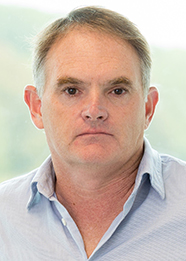
Professor Mark Hampton
Four Department of Pathology researchers have been awarded funding in the latest University of Otago Research Funding round.
Head of Department Professor Martin Kennedy has funding to evaluate methylome changes due to long term cannabis usage.
Professor Mark Hampton from the Centre for Free Radical Research has been awarded almost $80,000 over two years to investigate oxidative stress and ageing in the Dunedin study.
Funding to investigate the potential interaction of ascorbate with chemotherapy in a cancer model has been awarded to Associate Professor Gabi Dachs from the Mackenzie Cancer Research Group.
While Professor Steve Chambers from The Infection Group has been given a grant for his project on volatile markers of legionella metabolism, neutrophilic inflammation and their interaction.
September 2016
Department of Pathology showcases at Health Research Open Day
The Department of Pathology took the opportunity to showcase our research areas to the Christchurch public at the UOC Health Research Open Day on Sunday, 18 September.
Many of our research groups conducted laboratory tours each hour and had interactive stands set up in the foyer. Tours of the Denis Stewart Pathology Museum were also conducted.
Three of our PhD students gave three minute presentations in the Rolleston Lecture Theatre. Bee Bathish from the Centre from Free Radical Research discussed why you've Gotta love your oxidants; Emma Spencer, also from the Centre for Free Radical Research spoke about Targeting cancer cells with compounds from nature and Rebekah Crake from the Mackenzie Cancer Research Group presented Fighting fit: exercise therapy for improved chemotherapy outcome?
Dr Pippa Scott from The Infection Group and Professor Tony Kettle from the Centre for Free Radical Research both presented at the Research Showcase in the Rolleston Lecture Theatre.
First Inaugural Pathology Best Early Career Paper Prize winner announced
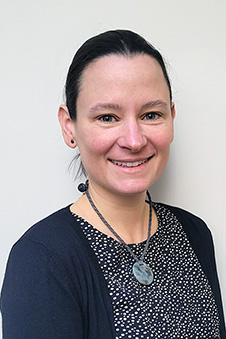
Dr Nina Dickerhof
Dr Nina Dickerhof from the Centre for Free Radical Research has been awarded the Inaugural Pathology Best Early Career Paper Prize for the article Macrophage migration inhibitory factor (MIF) Is rendered enzymatically inactive by myeloperoxidase-derived oxidants but retains its immunomodulatory function published in Free Radical Biology & Medicine.
Dr Dickerhof's paper describes a novel regulatory mechanism for macrophage migration inhibitory factor (MIF), a protein that plays an important role in our body's inflammatory response. During inflammation, neutrophils produce reactive oxidants to kill invading pathogens.
The paper shows that these oxidants also modify MIF. This is relevant because the site of modification influences the binding of MIF to its biological receptor. Furthermore, oxidatively modified MIF may also be a marker of neutrophil activation during inflammation.
This paper was the result of a fruitful collaboration with the laboratory of MIF expert Jürgen Bernhagen at the RWTH Aachen University in Germany.
Lisa Schindler, a student from the Aachen group visited the Centre for Free Radical Research for six months in 2014 and worked with Nina on the MIF project. She is currently undertaking a PhD at the LMU Munich and is investigating the contribution of the modified MIF discovered in Dr Dickerhof's paper to heart disease.
Winning paper reference:
Dickerhof, N., Schindler, L., Bernhagen, J., Kettle, A. J., & Hampton, M. B. (2015). Macrophage migration inhibitory factor (MIF) Is rendered enzymatically inactive by myeloperoxidase-derived oxidants but retains its immunomodulatory function. Free Radical Biology & Medicine, 89, 489-511. doi: 10.1016/j.freeradbiomed.2015.09.009
Learning about science by being part of the experiment
Postdoctoral Fellow Dr Pippa Scott from The Infection Group and her research into staphylococcus aureus transmission was featured in The Press and on stuff.co.nz on 10 September 2016.
Dr Scott has been studying whether the childrens' interactions lead to the spread of the disease by tracking each child in the study with a radio-frequency identification (RFID) tag. The tags do not have GPS or the ability to track locations.
Over the two month study period, Dr Scott swapped the children's noses several times to check for the staphylococcus bacteria.
The different strains of the bacteria will be genetically analysed and cross-referenced with the data from the RFID tags to see which children had which strain and when.
Dr Scott hopes that the findings of her research will help kids and the rest of the community be safer.
August 2016
Dad's cancer journey inspires student's PhD research
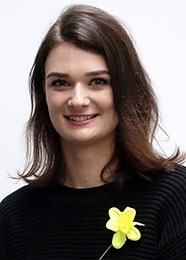
PhD student Bailey Kennedy
Bailey Kennedy from the Mackenzie Cancer Research Group shared with The Press and stuff.co.nz how her father's battle with colorectal cancer inspired her to undertake her PhD on the disease.
Her father, Steve Kennedy was diagnosed when Bailey was in her first year at high school. He underwent months of chemotherapy, radiation and surgery before going into remission.
One of her research supervisors was her father's oncologist.
Bailey's PhD project involves measuring numbers of neutrophils, the most common type of white blood cell, in colorectal cancer tumours.
- Read The Press article about Bailey Kennedy and her father on stuff.co.nz
- Otago student profile for Bailey Kennedy
CMRF funding success for the Department
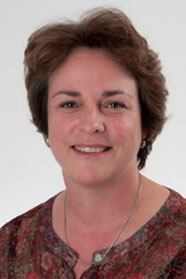
Dr Margaret Currie
Department of Pathology researchers received three out of the seven grants awarded in the Canterbury Medical Research Foundation's latest funding round.
Dr Margaret Currie from the Mackenzie Cancer Research Group received funding for her project on exercise as a cancer therapy.
Dr Andree Pearson from the Centre for Free Radical Research has funding to investigate mitochondria and ageing.
And Dr Anitra Carr from the Centre for Free Radical Research will use her funding for a project on intravenous vitamin C and sever sepsis outcomes.
Geneticist appointed as new HOD of the Department of Pathology
Genetics researcher Professor Martin Kennedy has been appointed as the new Head of the Department of Pathology.
He has worked on the University of Otago, Christchurch campus for nearly 30 years, starting in 1986 after completing his PhD at the University of Auckland, and returning in 1991 after postdoctoral studies at the MRC Laboratory of Molecular Biology in Cambridge, in the United Kingdom.
Professor Kennedy says he is very privileged to lead a department filled with so many dedicated and excellent researchers, teachers, students and support staff: “My main goal is to ensure we retain and further develop the wonderful environment we have in the department for research and teaching, to allow our staff and students to reach their full potential.”
Professor Kennedy will replace Professor David Murdoch, who steps down from the Head of Department role on September 1 to become Dean of the Christchurch campus.
Professor Murdoch says his successor is well known in the science community in New Zealand, as he has been a member of many research grant panels and committees.
“I am sure that the Department will continue to succeed and flourish under Martin's collaborative and inclusive style of management.”
June 2016
Genetics professor awarded HRC project grant
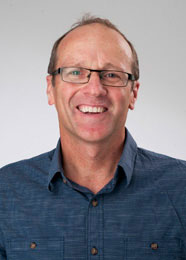
Professor Martin Kennedy
Professor Martin Kennedy from the Gene Structure and Function Laboratory has been awarded a Heath Research Council project grant to clarify how genes contribute to adverse reactions to drugs used in the treatment of common illnesses like hypertension, acid reflux, and depression.
Professor Kennedy's laboratory, along with Associate Professor Matt Doogue from Clinical Pharmacology, will also develop a biobank to collect and store samples from patients suffering a wide range of serious ADRs, so genetic underpinnings of many such ADRs can be examined.
Adverse drug reactions (ADRs) cause a great deal of illness and death. It is likely many have genetic origins.
May 2016
HOD appointed as new Dean of the Christchurch campus
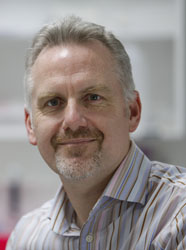
Professor David Murdoch
Head of Department Professor David Murdoch has been appointed as the new Dean of the University of Otago, Christchurch. He will replace incumbent Dean, Professor Peter Joyce, who retires in September.
Professor Murdoch says he is honoured to be selected as Dean of the Christchurch campus.
“I have been very proud to work at the University of Otago's Christchurch health campus for the past 16 years, and excited to become its Dean. We have a real strength in producing health research at the Christchurch campus. A large part of this success is due to collaborations with the Canterbury District Health Board, with its doctors and nurses working closely with scientists on clinical studies. We are also now part of a wider Canterbury health community with the establishment and evolution of the Health Precinct. University of Otago, Christchurch, researchers and teachers collaborate on a global scale. I am keen to grow this global perspective in my time as Dean.”
HRC Emerging Researcher First Grant for infectious diseases Postdoctoral Fellow
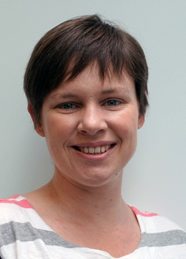
Dr Pippa Scott
Dr Pippa Scott from The Infection Group has been awarded an Emerging Researcher First Grant from the Health Research Council to investigate the transmission of infectious bacteria between cattle and people in rural communities.
Dr Scott receives $149,982 to identify interventions to control transmission of zoonotic pathogens to humans. Changing farming practices in New Zealand are creating conditions promoting pathogen transfer between species.
The project will examine two zoonotic bacteria will be examined: Shiga-toxin producing Escherichia coli (STEC) and Staphylococcus aureus. STEC causes severe diarrhoea, while S. aureus causes serious skin and bloodstream infections.
PhD student's discovery becomes front page news
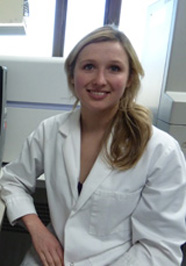
PhD Student Hannah Kennedy
PhD student Hannah Kennedy from the Molecular Pathology Laboratory has uncovered the underlying genetic cause of the death of two teenage boys in a New Zealand family.
Details of the discovery were featured in a front page story of The Press newspaper and the stuff.co.nz website on 11 May 2016.
The deaths occurred after ingestion of small volumes of alcohol, with both boys dying in their sleep. The family sensitivity to alcohol was already suspected, as both boys (and their brother and sister) had experienced muscular pain after ingestion of traces of ethanol, as would be found in children's cough medicine at the time.
After 20 years of searching for a cause, Hannah Kennedy and scientists from Canterbury Health Laboratories (CDHB) identified two mutations, which were responsible for the sudden death of the two boys. These mutations are found in a gene called PPA2, which encodes an enzyme that functions in the mitochondrial respiratory chain, responsible for producing energy in cells.
Both parents are carriers of one of these mutations, meaning they have one copy of the gene which is mutated, and one normal copy. This means they are unaffected, while the children have two mutated copies and the enzyme cannot function normally. PPA2 has not been previously associated with human disease.
Since the identification of this family, an international collaboration has started between the University of Otago, Christchurch, the Canterbury Health Laboratories and several large European Laboratories based in Germany, Austria and the UK. Additional patients have now been identified who also have mutations in PPA2, and mitochondrial disease, with these more severe mutations resulting in death at a much earlier age.
HRC Hercus Fellowship for free radical researcher
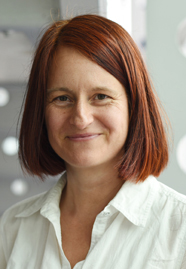
Dr Anitra Carr
Dr Anitra Carr from the Centre for Free Radical Research has been awarded a $500,000 Sir Charles Hercus Health Research Fellowship for promising emerging researchers.
Dr Carr will undertake New Zealand's first study of vitamin C's potential as a treatment for intensive care patients with sepsis.
She says sepsis is the main cause of death in intensive care patients. Rates are increasing and treatment options for the life-threatening condition are limited. Patients with severe sepsis often develop cardiac dysfunction and dangerously low blood pressure (known as septic shock) and are given drugs to stabilize their cardiovascular function.
Dr Carr will carry out a clinical trial in Christchurch where people with sepsis are given the vitamin to see if this intervention results in a better recovery or survival. She will be trying to find out whether the positive biological effects of vitamin C translate into an improvement in patient outcome, which has been reported in a smaller study overseas. Her study will also involve comparing vitamin C levels with severity of illness and whether this contributes to progression of sepsis.”
April 2016
Will eating cake give me cancer?
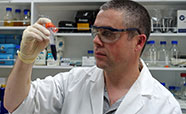
Dr Logan Walker in the lab
Dr Logan Walker from the Mackenzie Cancer Research Group spoke at the UOC Public Health Lecture Series on 13 April 2016 at the Rolleston Lecture Theatre.
His talk entitled, Will eating cake give me cancer? highlighted a number of cancer myths, demonstrate how researchers distinguish fact from fiction, and answer questions, including: “If someone in my family has cancer, will I get cancer too?” and “Can cancer be prevented?”
In the lead up to the lecture, Dr Walker was interviewed by Newtalk ZB's Chris Lynch.
Dr Walker's lecture will be available to watch online very soon.
Our singing haematologist shaves for a cure

Dr Sean MacPherson
Senior Lecturer and Clinical Haematologist Dr Sean MacPherson has written a theme song for the Leukaemia and Blood Cancer New Zealand's Shave for a Cure charity promotion.
TVNZ's Seven Sharp filmed the recording of the song and the accompanying music video. The item aired on 7 April 2016.
One Health: A global approach to tackling infectious diseases
HOD Professor David Murdoch spoke at the UOC Public Health Lecture Series about the One Health approach to tackling infectious diseases on 6 April 2016 at the Rolleston Lecture Theatre.
One Health recognises the links between humans, other animals and the environment, and is gaining momentum in the fight against infectious diseases.
Professor Murdoch discussed the use of One Health principles - which recognise that the health of humans and animals, and viability of ecosystems are inextricably linked - in addressing important infectious diseases, including neglected infections in developing countries.
Professor Murdoch's lecture will be available to watch online very soon.
Free Radical Professor's opinion pieces published in Fairfax papers
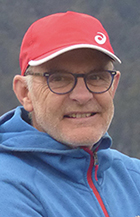
Prof Tony Kettle
Professor Tony Kettle from the Centre for Free Radical Research has written two opinion pieces about the current state of science funding in New Zealand. They both featured in Fairfax newspapers including The Press and stuff.co.nz in late March and early April 2016.
The first piece entitled, Bold approach in science sector is essential to boost NZ's innovation, discusses the impact inadequate investment in science has on the country's ability to develop an innovative economy.
Professor Kettle points out that success rates for funding from the Health Research Council and the Marsden Fund currently hover below 10 per cent.
In the second piece, The Harvard of agriculture will take Harvard-like funding, Professor Kettle argues that serious money has to be invested into New Zealand universities if we are going to have the agricultural equivalent to Harvard that Prime Minister John Key dreams of.
Both of Professor Kettle's articles can be read online:
- Bold approach in science sector is essential to boost NZ's innovation
- The Harvard of agriculture will take Harvard-like funding
First Department of Pathology Symposium held
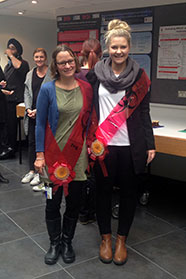
Dr Nina Dickerhof and Rebekah Crake
Our first departmental symposium included 18 presentations from mostly early career researchers, a potluck dinner and a recycled poster competition.
The presenters could speak on any topic for 10 minutes which created a vary programme including presentations on The secret double life of Haematology Man, What happens when I prick my finger while working in the garden?, Leukaemia and immune responses and Genetic variability in familial breast cancers.
Dr Nina Dickerhof from the Centre for Free Radical Research won the People's Choice Award for the best presentation. Her talk was entitled The science of mountaineering.
PhD Rebekah Crake from the Mackenzie Cancer Research Group was awarded the Best Recycled Poster.
The symposium also featured a quiz about the presenters and this was won by HOD Professor David Murdoch.
Plans are already underway for the next one which will be held in November.
March 2016
Power of vitamin C
Professor Margreet Vissers and her vitamin C and cancer research featured in the March 2016 edition of Otago Magazine.
Professer Vissers and her team in the Centre for Free Radical Research are about to begin the first study in people that investigates the effect of intravenous vitamin C treatment on tumour biology. This study will help determine a mechanism of action and has been made possible by the generous donations of many private donors.
“Many of those who have donated are affected by cancer, either themselves or someone close to them. They want information. They may have asked 'would taking vitamin C be good for me or my loved one?' and found there are no good answers to that question.''
The study will be of twelve patients with colorectal cancer and each will either get four daily injections of vitamin C or a placebo. Intravenous injection is the most commonly used method in “alternative” medicine and may result in better access for ascorbate into the difficult-to-access tumour environment.
“The patient will receive the vitamin C treatment prior to surgery. We will analyse tissue taken before and after vitamin C treatment to determine what the intervention has done – if anything – and if it affects any of the biological processes we know encourage tumour growth,'' Professor Vissers says.
Notable entry for administrator in the Otago Staff Photo Competition
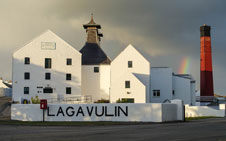
Photo by Alice Milnes
A photo of Lagavulin Distillery on Islay in Scotland with a rainbow behind has won Teaching Administrator Alice Milnes a notable entry in the annual University of Otago Staff Photo Competition.
Alice took the photo on the first night of her trip around the Scottish highlands and isles in June last year.
In 2015, the photo competition was won by Pathology Postdoctoral Fellow Markus Dagnell who is based in the Centre for Free Radical Research.
February 2016
Teaching Gold Medal for Anatomical Pathology Convener
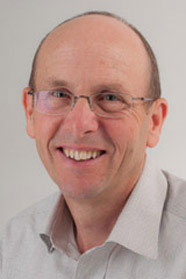
Dr Andrew Miller
Dr Andrew Miller was awarded a UOC Gold Medal for Excellence in Teaching at the Academic Welcome on 12 February 2016.
The criteria for the School's top teaching award is sustained, outstanding, excellent contribution to teaching.
Andrew is the convener for our Anatomical Pathology undergraduate teaching programme. Over the years he has developed the combined Anatomical Pathology-Radiology tutorials for the fourth year medical students with Dr Mike Hurrell from Radiology. Mike was also the recipient of a Teaching Gold Medal.
At the ceremony UOC Teaching Awards were given to Professor Margreet Vissers (Centre for Free Radical Research) and Dr Anja Werno (Microbiology/The Infection Group).
January 2016
Cancer genetics researcher on One News
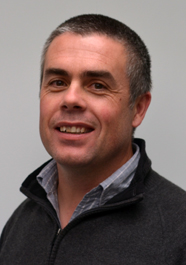
Dr Logan Walker
Dr Logan Walker from the Mackenzie Cancer Research Group featured in an item about access to genetic testing on TVNZ's One News on Sunday 17 January 2016.
The item discussed how genetic screening in New Zealand for breast cancer indicator genes BRCA 1 and 2 has limited eligibility, leading to concerns over the restrictions.
Dr Walker is one of the scientists currently studying how to make the genetic screening programme more effective.
2015
December 2015
A radical life – Festschrift for Professor Christine Winterbourn
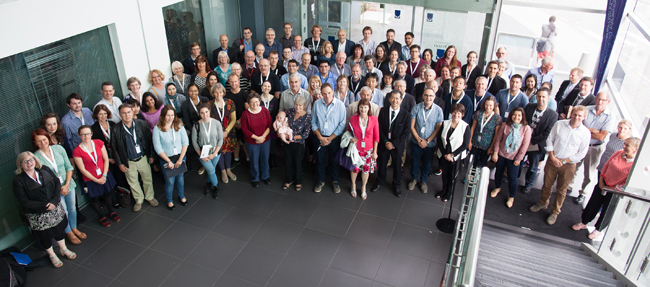 Scientists from around the world this week celebrated the exceptional career of Professor Christine Winterbourn, whose research in the area of free radical science has spanned more than four decades.
Scientists from around the world this week celebrated the exceptional career of Professor Christine Winterbourn, whose research in the area of free radical science has spanned more than four decades.
The Festschrift for Professor Winterbourn also marked the beginning of an international conference of free radical scientists.
Professor Winterbourn says she enjoyed the gathering of so many past students, colleagues and collaborators and listening to them describe their experiences of working or interacting with her over the years. In her Festschrift address, she recounted her memories of the development of the field of free radical biology from its early beginnings, how her work influenced this development, and the pleasure she had derived from her research career.
Professor Tony Kettle is a director of the Centre for Free Radical Research and one of the many scientists Professor Winterbourn has mentored.
He says it was essential a Festschrift be held for Professor Winterbourn because of her enormous contribution to science in New Zealand and internationally.
Professor Kettle says the Festschrift was a great success with speakers all acknowledging Professor Winterbourn's amazing contribution to science. A highlight was the presentation by the Vice Chancellor Professor Harlene Hayne of a book (entitled A Radical Life) containing tributes from more than 50 of her students and colleagues.
Read the media release about the Festschrift
Read the full article on Otago Bulletin
Royal College of Pathologists of Australasia Outstanding Teaching Award
Dr Jacqui Gardner has received an Outstanding Teaching Award from the Royal College of Pathologists of Australasia.
November 2015
NZSO Translational Research Award for free radical professor
Professor Margreet Vissers from the Centre for Free Radical Research was the 2015 recipient of the New Zealand Society for Oncology Translational Research Award.
The award is in recognition of Professor Vissers' vitamin C and cancer research.
October 2015
Radio New Zealand interviews Free Radical Researcher about antibiotic resistance

Professor Tony Kettle
Professor Tony Kettle from the Centre for Free Radical Research discussed antibiotic resistance on Radio New Zealand's Sunday Morning programme on 18 October 2015.
The Centre for Free Radical Research were awarded $4.8 million by the HRC earlier this year to find new ways to diagnose and treat bacterial infections.
Antibiotic resistant bacteria is fast becoming a major global health issue. Professor Kettle told Radio New Zealand that antibiotics could become useless against infections within 10 years unless we change the way we use them.
Listen to the interview on Radio New Zealand
September 2015
Free Radical Researcher featured on TVNZ's One News
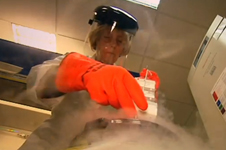
Professor Margreet Vissers in the lab
Centre for Free Radical Research Principal Investigator Professor Margreet Vissers featured on TVNZ's One News on Tuesday, 28 September 2015.
The news item was about recent funding Professor Vissers received from the New Zealand Breast Cancer Foundation and the Canterbury Medical Research Foundation to further her work on vitamin C and cancer.
Professor Vissers and her team will use the funds to investigate if high dose vitamin C is a viable cancer therapy by exploring its effect on breast tumours.
Professor Vissers says the use of vitamin C by cancer patients is commonplace, but controversial. While there are reports of success, there is little scientific evidence to help our understanding of the role vitamin C might play.
Watch the One News item
Read the press release about this study
Learn more about the Vitamin C for Cancer Trust
Cancer Researcher recipient of Rutherford Discovery Fellowship

Dr Logan Walker
Senior Research Fellow Dr Logan Walker is one of twelve Rutherford Discovery Fellows announced for 2015 by the Royal Society of New Zealand.
Dr Walker will receive $800,000 over the next five years to develop better methods for identifying high-risk breast and ovarian cancer patients, and new approaches for evaluating the clinical significance of genetic changes.
The new knowledge and expertise derived from this project will facilitate the development of genomic-based protocols to evaluate genetic changes responsible for other inherited diseases.
CMRF Major Project Grants for Emerging Researchers awarded to the Department
 The Department of Pathology, UOC took out four of the Canterbury Medical Research Foundation's Major Project Grants for Emerging Researchers in the 2015 round.
The Department of Pathology, UOC took out four of the Canterbury Medical Research Foundation's Major Project Grants for Emerging Researchers in the 2015 round.
From the Centre of Free Radical Research Dr Anitra Carr received funding to investigate Vitamin C requirements in severe infection; and Dr Juliet Pullar received funding for her project on Red blood cell vitamin C: a useful indicator or patient ascorbate status?
Dr Logan Walker's project for RNA isoform profiling of breast cancer susceptibility genes was also successful in the funding round. Dr Walker is based in the MacKenzie Cancer Research Group.
The Infection Group's Dr Anja Werno also received a grant for a project on Mycoplasma genitalium macrolide and fluoroquinolone.
June 2015
Two Pathology Researchers receive Early Career Awards

Dr Anitra Carr
Two of the five Otago Early Career Awards for 2015 went to researchers in the Department of Pathology.
Dr Logan Walker (Mackenzie Cancer Research Group) and Dr Anitra Carr (Centre of Free Radical Research) were selected for the award on the basis of their outstanding research achievements.
Each recipient receives $5000 to support their research and scholarly development.
Dr Walker said that he is very appreciative of the award.
“It will be used to strengthen my links with national and international collaborators so that my research can continue to help high-risk cancer families.”
Dr Carr says, “I was really surprised and pleased to receive this award. As a working mother who has had to take time out from research to raise children, I appreciate still being considered eligible for this early career award.”
HRC funding to find new ways to save lives by killing antibiotic-resistant bacteria
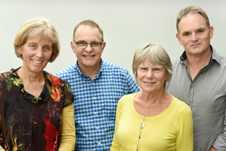
CFRR Principal Investigators
The Centre for Free Radical Research has been awarded $4.8 million in Health Research Council funding over the next 5 years to find new ways to diagnose and treat bacterial infections.
The program of research recognises the significant threat posed by growing rates of global infections, and the ever decreasing ability of antibiotics to kill bacteria that cause fatal infections. Research projects will be led by Professors Mark Hampton, Margreet Vissers, and Christine Winterbourn.
Antimicrobial resistance is recognised by Governments and international medical bodies as a serious threat to health and lives. Dire scenarios predict that within the next decade people will die from infections we now treat simply with antibiotics.
Professor Tony Kettle says the overuse of antibiotics, particularly general ones that target many types of bacteria, has allowed a wide range of bugs to develop resistance, and render many common antibiotics useless.
Over five years, the Centre will:
- Develop better ways to determine exactly which bacteria are responsible for an infection so the right antibiotics can be used.
- Understand how some bacteria evade neutrophils and promote serious infections.
- Identify new strategies for the development of new types of antibiotics.
The HRC also awarded Professor Kettle $800,000 to understand how white blood cells damages the lungs of young children with cystic fibrosis.
May 2015
Free radical researcher awarded HRC Feasibilty Study Grant to study vitamin C and cancer
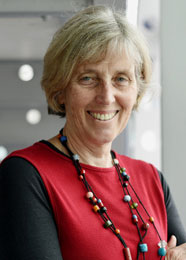
Professor Margreet Vissers
Professor Margreet Vissers from the Centre for Free Radical Research has been awarded a HRC feasibility study grant for a vitamin C and cancer study.
Professor Vissers has done many studies on vitamin C, and in both laboratory studies and the analysis of human cancer tissue has found evidence that the more ascorbate a cancerous tumour contains, the slower it grows.
With this $100,000 HRC grant, Professor Vissers and her team will collect tumour tissue from colorectal cancer patients, before and after surgery, to determine whether vitamin C accumulates in the tumour tissue and whether this affects its biology in a way that could slow cancer growth and spread.
Many cancer patients seek alternative therapies for their disease, with the administration of high-dose vitamin C (ascorbate) being commonplace. This practice continues despite a lack of evidence as to its efficacy and a lack of understanding of how vitamin C might be of benefit.
Infectious disease spread looming issue for Nepal

Professor David Murdoch
There is a high chance of the spread of potentially life-threatening diseases such as gastroenteritis and cholera in post-quake Nepal, but New Zealanders can play their part in saving lives, says Professor David Murdoch an infectious disease expert who was in Nepal when the disaster struck.
Over the past two decades, the Head of the Department of Pathology has worked and conducted research studies in Nepal, including providing evidence to establish a national pneumonia vaccination for children. He is also a board member of the Himalayan Trust, set up by Sir Edmund Hillary.
Professor Murdoch was in Kathmandu to work and teach at Patan Hospital when the magnitude 7.8 earthquake hit.
He says that hospital had a disaster plan for such an event which they had practiced last year, and in the days following were coping extremely well considering the scale of the disaster.
Food, fresh water and safe shelter were likely to be in short supply both in the city and rural areas. In such situations with displaced populations, the spread of diseases such as cholera and gastroenteritis is a common occurrence, Professor Murdoch says.
Ongoing financial assistance to help provide these basics could minimise the spread of disease and further death. Professor Murdoch says far richer countries than Nepal would struggle to deal with a natural disaster on the scale of the recent earthquakes.
He flew out of the country several days after the initial earthquake.
“It was one of the hardest decisions of my life. It was gut-wrenching. My connection with Nepal is deeply personal and a large part of me wanted to stay behind, but I hope I can do more good by being in New Zealand through activities of the Himalayan Trust.''
March 2015
Anorexia Nervosa Genetics Initiative (ANGI) launches in New Zealand
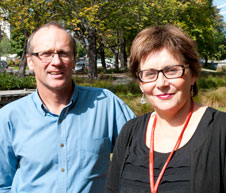
Prof Martin Kennedy and Dr Jenny Jordan
The Anorexia Nervosa Genetics Initiative (ANGI) has been launched in New Zealand with a lecture about eating disorder myths Professor Cindy Bulik from the University of North Carolina, USA.
Genetics Professor Martin Kennedy and Dr Jenny Jordan (from Department of Psychological Medicine) are establishing the New Zealand arm. Globally, more than 13,000 people will be recruited to the ANGI study, including more than a thousand New Zealanders.
The initiative is the most rigorous global effort to detect genetic variations contributing to this potentially life-threatening illness.
Professor Kennedy says it was previously thought studying hundreds of people's genes could identify significant variations related to a psychiatric disease. However it is now believed studying thousands of people is more likely required, because each gene has only a tiny effect on risk.
“It is possible there are hundreds of genes involved in anorexia nervosa, related to controlling certain brain pathways. If we understand the pathways affected, we can start to target them with medication. Anorexia is a complex disease but the ANGI project is a step down a long path that we hope will ultimately lead to better prediction, prevention and treatment.''
To be part of the ANGI study, people will have been diagnosed with anorexia nervosa at any time in their life.
Watch Prof Cindy Bulik's Public Health Lecture
February 2015
Pathology staff receive Teaching Awards at Academic Inauguration
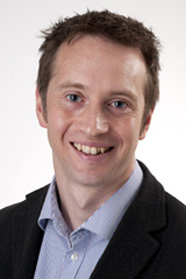
Dr Sean MacPherson
Two members of the Mackenzie Cancer Research Group were awarded Teaching Awards by Professor Peter Joyce, Dean of UOC at the 2015 Academic Inauguration on 13 February 2015.
A/Prof Gabi Dachs and Dr Margaret Currie were among the recipients this year, along with Dr Gavin Harris from Anatomical Pathology.
Dr Sean MacPherson, Senior Lecturer of Haematology was also recognised for his teaching efforts by the undergraduate students. He won the CMSA Best Vertical Module Teacher Award from both the Year Four and Year Five MB ChB 2014 classes.
January 2015
Pathology summer students win Best Project Prizes
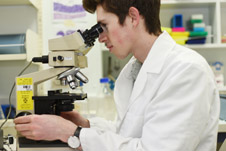
Summer Student Sam Hall-McMaster
Two Department of Pathology summer students have been awarded prizes at the UOC Summer Student Final Presentations session.
Mackenzie Cancer Research Group student Sam Hall-McMaster recieved the Best Overall Project Prize for his project, Are breast tumour cells and adipocytes co-conspirators in aggressive breast tumours?
Sam completed his 10 week project under the supervision of Dr Elisabeth Phillips and Dr Margaret Currie.
The Best Laboratory Prize was awarded to Centre for Free Radical Research student Helena Trollope. Helena's project Reactions of urate hydroperoxide with biological targets was supervised by Prof Tony Kettle.
Sam and Helena will be presented their awards at the 2015 Academic Inauguration.
Pathology researchers receive academic promotions
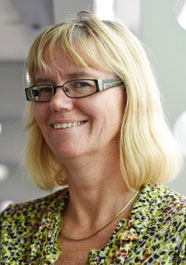
Associate Professor Gabi Dachs
Mackenzie Cancer Research Group researcher Gabi Dachs has been promoted to Research Associate Professor.
Dr Logan Walker, also from the Mackenzie Cancer Research Group and Dr Anitra Carr from the Centre for Free Radical Research have both been promoted to Senior Research Fellows.
The promotions were announced by Vice-Chancellor Professor Harlene Hayne. These well-earned promotions take effect from 1 February.
2014
December 2014
The Infection Group featured in the 2014 BMJ Christmas edition
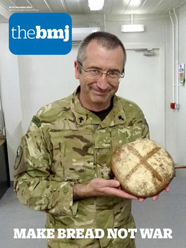 Writing in the tongue and cheek Christmas edition of the BMJ, researchers from The Infection Group's VIDARIS study have determined that vitamin D supplementation did not reduce the adverse impact of earthquakes in healthy adults.
Writing in the tongue and cheek Christmas edition of the BMJ, researchers from The Infection Group's VIDARIS study have determined that vitamin D supplementation did not reduce the adverse impact of earthquakes in healthy adults.
The data comes from 322 participants who took part in the VIDARIS study which was a double blind randomised placebo controlled trial investigating the effect of vitamin D supplementation on the incidence and/or severity of acute respiratory infections-colds and flu in adults.
The study was conducted in Christchurch, New Zealand, between February 2010 and November 2011. During this time, the region experienced a series of catastrophic earthquakes. These began on 4 September 2010 at 4 35 am, when a magnitude 7.1 earthquake struck. A series of aftershocks followed, with the most devastating being a 6.3 magnitude earthquake on 22 February 2011 at 12 51 pm, resulting in 185 deaths, the loss of more than 60% of the central business district, and severe damage to housing and infrastructure.
Participants were randomised to vitamin D received orally supplementation of 200 000 IU at study initiation, another 200 000 IU one month later, and then 100 000 IU monthly thereafter for 18 months. Those randomised to placebo received matching inactive tablets given in an identical dosing regimen.
A total of 308 participants completed an earthquake impact questionnaire, which found no difference in the overall impact score between the group taking vitamin D and those on the placebo.
- Read the BMJ article Effect of monthly vitamin D3 supplementation in healthy adults on adverse effects of earthquakes: randomised controlled trial
- Find out more about the original VIDARIS study
Cure Kids funding for The Infection Group
 Research Fellow Dr Amy Scott-Thomas from The Infection Group's Breath Research Lab has been awarded funding from Cure Kids to investigate if a non-invasive breath test can distinguish between non-mucoid and mucoid P. aeruginosa infection in the cystic fibrosis lung.
Research Fellow Dr Amy Scott-Thomas from The Infection Group's Breath Research Lab has been awarded funding from Cure Kids to investigate if a non-invasive breath test can distinguish between non-mucoid and mucoid P. aeruginosa infection in the cystic fibrosis lung.
November 2014
Marsden funding success for the Centre for Free Radical Research
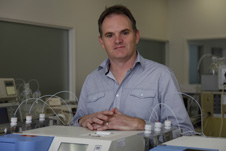 Professor Mark Hampton from the Centre for Free Radical Research has been awarded $815,000.00 of Marsden funding over three years for his project on “Redox regulation of necroptotic cell death''.
Professor Mark Hampton from the Centre for Free Radical Research has been awarded $815,000.00 of Marsden funding over three years for his project on “Redox regulation of necroptotic cell death''.
The success rate for standard projects in the biomedical science category was only 5.9%, which translates into 7 of 118 grants funded.
The project includes co-investigators from Australia (James Murphy), India (Vikas Kumar) and the USA (Guy Salvesen).
The project will investigate multicellular organisms which have carefully regulated death programs to remove damaged or unwanted cells. Faults in these programs contribute to human disease.
Apoptosis is the best-studied cell death program, and drugs have been designed to promote apoptosis in cancer cells. Necroptosis is a newly recognised cell death program, and little is understood about the cellular changes that occur upon
activation.
Preliminary data indicate increased oxidation of specific cellular proteins and a dramatic loss in mitochondrial function during the early stages of necroptosis. This project will use newly-developed technology to unravel the details of these redox changes and their significance in the initiation and regulation of necroptosis.
Prof Hampton will also determine if the sensitivity of cells to necroptosis can be promoted or inhibited by genetic and pharmacological modification of the antioxidant pathways of cells.
October 2014
Chlorine on the airways: Radio NZ Our Changing World Series
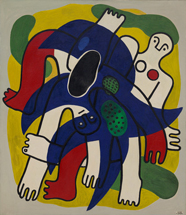
Starfish (L'Etoile de mer) by Fernand Léger. Photo: Artists Rights Society (ARS), New York / ADAGP, Paris
Professor Tony Kettle from the Centre for Free Radical Research was interviewed for Radio New Zealand's Our Changing World Series which aired on 15 October 2014.
In the feature, Chlorine bleach in the airways, Tony and some of his team explain how they have discovered the lungs of children with cystic fibrosis were damaged from an early age by white blood cells trying to kill bacteria.
Chlorine bleach, produced by the white blood cells to kill bacteria, destroys critical molecules in the airways.
Free Radical Research Featured on TVNZ's Sunday
 Professor Margreet Vissers from the Centre for Free Radical Research appeared on TVNZs Sunday programme in an story on high dose vitamin C and cancer.
Professor Margreet Vissers from the Centre for Free Radical Research appeared on TVNZs Sunday programme in an story on high dose vitamin C and cancer.
Lab tests at UOC have shown tumours with higher levels of Vitamin C were less aggressive and slower to grow than ones with lower levels of the vitamin.
Now Margreet wants to take these investigations to a new level with human trials.
"What we want to find out, we want to know is if we increase the amount of Vitamin C is that going to slow the tumour growth as well? We suspect it will."
Patients would be given high doses of Vitamin C intravenously under controlled conditions. Professor Vissers' team would monitor the impact of the Vitamin on the cancer.
But this new trial needs about $1 million in funding and money is scarce. The Health Research Council recently declined an application for full funding, so the University is re-applying for a smaller amount of start-up money.
"We're ready to go," Professor Vissers says, adding, "we have all of the expertise in place, we have all of the samples in place, we have all of the collaborations in place."
The article, A miracle man, originally screened on 12 October at 7.00pm on TV One.
Watch A miracle man article online
Learn more about The Vitamin C for Cancer Trust
September 2014
CMRF funding success for the Department
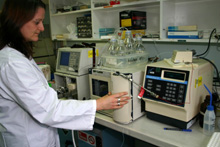 Five of the nine research grants awarded by the Canterbury Medical Research Foundation went to staff in the Department of Pathology.
Five of the nine research grants awarded by the Canterbury Medical Research Foundation went to staff in the Department of Pathology.
Dr Amy Scott-Thomas from The Infection Group has been awarded funding for her project on the development of a non-invasive breath test for Legionnaires' disease.
Funding to investigate oxidative stress in the pathology and treatment of cystic fibrosis has been awarded to Dr Nina Dickerhof from the Centre for Free Radical Research.
Dr Stephanie Bozonet from the Centre for Free Radical Research has received funding to investigate the regulation of endothelial cell death by hypothiocyanous acid.
Dr Louisa Forbes from the Centre for Free Radical Research has been awarded a grant for her project to screen for potent inhibitors of myeloperoxidase.
Dr Paul Pace, also from the Centre for Free Radical Research, has received a grant for his project on redox regulation of neuronal development by the antioxidant Rrx2.
July 2014
Gene Structure and Function Laboratory get access to tiny super DNA tester
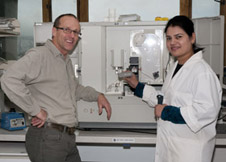 The Gene Structure and Function Laboratory have won the right to trial arguably the world's smallest and most efficient DNA analyser.
The Gene Structure and Function Laboratory have won the right to trial arguably the world's smallest and most efficient DNA analyser.
Professor Martin Kennedy and his colleagues are among a select group of researchers worldwide given the hand-held DNA sequencer. The tiny device can analyse DNA 500 times faster than the expensive, suitcase-sized machine currently used by Professor Kennedy's laboratory.
The 'MinIon' machine was developed in the United Kingdom. Scientists applied, then had to pass a selection process, to test the machine and provide feedback before the units are release for sale.
Professor Kennedy says the machines are novel because of their small size, ability to analyse long strands of DNA, and the technology used in them.
“There are other machines on the market which can do the same thing but they cost $1 million each. We really hope these simple-to-operate, little machines will allow more people to access the technology for a lot less money.''
June 2014
2014 HRC Project Funding for Legionnaires' Disease
 Head of Department Professor David Murdoch has been awarded a 2014 Health Research Council Project Grant to further investigate Legionnaires' disease in New Zealand: improving diagnostics and treatment.
Head of Department Professor David Murdoch has been awarded a 2014 Health Research Council Project Grant to further investigate Legionnaires' disease in New Zealand: improving diagnostics and treatment.
Legionnaires' disease is a severe type of pneumonia that is under-diagnosed in New Zealand. Special tests are required to make a diagnosis of legionnaires' disease, but there are no clear guidelines about which patients to test.
An enhanced testing system for legionnaires' disease was developed in Canterbury and has been used there since 2010. The system involves targeted use of the current best test for legionnaires' disease: PCR (polymerase chain reaction), which detects bacterial DNA. This approach has uncovered many cases of legionnaires' disease that would have otherwise gone undetected.
This study will roll out this same testing strategy across New Zealand for one year in order to measure the national burden of legionnaires' disease, to improve patient treatment, to identify cost-effective ways to test for legionnaires' disease in the future, and to create better guidelines for the treatment of pneumonia.
Other investigators working on this project include Prof Steve Chambers, A/Prof Patricia Priest and Dr Ian Sheerin.
April 2014
Postgraduate Tassell Scholarship in Cancer Research
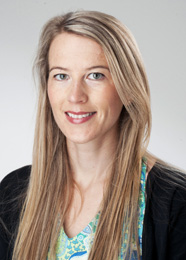 Recent BBiomedSc(Hons) graduate Annika Seddon has been awarded the Postgraduate Tassell Scholarship in Cancer Research to undertake her PhD studies in the Centre for Free Radical Research.
Recent BBiomedSc(Hons) graduate Annika Seddon has been awarded the Postgraduate Tassell Scholarship in Cancer Research to undertake her PhD studies in the Centre for Free Radical Research.
Annika will begin her PhD entitled, Investigating the biology of tumour-associated neutrophils on 1 April and will be supervised by Professor Mark Hampton, Dr Margaret Currie (Mackenzie Cancer Research Group) and Professor Tony Kettle.
March 2014
Testing for Legionnaires' disease: Radio NZ Our Changing World
 Professors David Murdoch and Steve Chambers were recently interviewed for Radio NZ's Our Changing World series about their research into Legionnaires' disease.
Professors David Murdoch and Steve Chambers were recently interviewed for Radio NZ's Our Changing World series about their research into Legionnaires' disease.
In the feature, Testing for Legionnaires' Disease, David and Steve discuss how through a collaboration with the Canterbury Health Laboratories every person admitted to Christchurch Hospital with pneumonia is now routinely screened for Legionnaires' disease. The results have seen a fourfold increase in confirmed cases of Legionnaires' disease.
February 2014
Awards for Pathology Staff at Academic Inauguration 2014
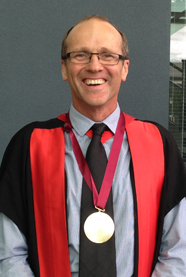 The Department of Pathology received a number of awards at the Academic Inauguration held on 14 February 2014 in the Rolleston Lecture Theatre.
The Department of Pathology received a number of awards at the Academic Inauguration held on 14 February 2014 in the Rolleston Lecture Theatre.
Professor Martin Kennedy from the Gene Structure and Function Laboratory was the recipient of a University of Otago Research Gold Medal.
A number of teaching awards were also received with the Pathology Vertical Module voted as CMSA Best Vertical Module – 4th Year, and Dr Sean MacPherson winning CMSA Best Vertical Module Teacher – 5th Year. These two awards were voted for by the UOC Medical Students at the end of last year.
Dr Andrew Miller and Dr Alastair Murray from Anatomical Pathology each received a Teaching Award from the Dean, Professor Peter Joyce.
Summer student Hannah Palmer from the Mackenzie Cancer Research Group was also presented the Canterbury Branch NZ Federation of Graduate Women (Inc) Trust Board Prize for Best Overall Project.
January 2014
Pathology Summer Student wins Best Overall Project Prize
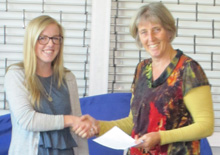 Mackenzie Cancer Research Group Summer Student Hannah Palmer has won the UOC Overall Best Project Prize for 2013-14.
Mackenzie Cancer Research Group Summer Student Hannah Palmer has won the UOC Overall Best Project Prize for 2013-14.
During her 10-week project, Hannah investigated how a protein in fatty tissue can make breast tumour cells more invasive, leading to increased metastasis and, ultimately, more cancer deaths.
The results show that proteins secreted by fatty tissue promote migration of breast cancer cells, meaning that obesity or excess fatty tissue not only increases incidence of cancer occurring but is also associated with a worse prognosis in those already suffering with cancer.
Hannah's project was supervised by Dr Elisabeth Phillips and was funded by the Breast Cancer Foundation.
Read The Press/Stuff article about Hannah's project.
2013
December 2013
Free Radical Researcher promoted to full Professor
 Congratulations to Prof Mark Hampton on his promotion to full Research Professor.
Congratulations to Prof Mark Hampton on his promotion to full Research Professor.
Prof Hampton is one of 12 academics at Otago being promoted to full Professor in February after a thorough evaluation and advice from international experts.
The promotions were announced by Vice-Chancellor Professor Harlene Hayne who warmly congratulated the new professors on their well-earned promotions.
November 2013
Free Radical Professor featured in the NZ Listener
 Professor Tony Kettle's research into chlorine bleach and cystic fibrosis in children has been profiled in the NZ Listener.
Professor Tony Kettle's research into chlorine bleach and cystic fibrosis in children has been profiled in the NZ Listener.
Last month Professor Kettle received a Marsden Grant to further his research into chlorine bleach.
The article Our Chemical Romance: Bleach produced in the body can be both good and bad for our health, features in issue 3837, dated 23 November 2013.
New research on Legionnaires' disease featured on TVNZ's One News
 HOD Professor David Murdoch was interviewed for TVNZ's One News on 2 November about new research by the Microbiology Research Group to uncover the exact cause of Legionnaires' disease.
HOD Professor David Murdoch was interviewed for TVNZ's One News on 2 November about new research by the Microbiology Research Group to uncover the exact cause of Legionnaires' disease.
Traditionally the disease has been linked with the use of potting mix but they now suspect there may be more to it than that.
Professor Murdoch said many people who contract the disease say they have not been in contact with potting mix but have reported a history of gardening.
Watch Professor Murdoch on One News.
October 2013
New Marsden Grant for the Centre for Free Radical Research
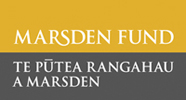 Professors Tony Kettle and Christine Winterbourn from the Centre for Free Radical Research have gained a Marsden grant to investigate how and when chlorine bleach ties knots in proteins.
Professors Tony Kettle and Christine Winterbourn from the Centre for Free Radical Research have gained a Marsden grant to investigate how and when chlorine bleach ties knots in proteins.
Chlorine bleach – the chemical we use around the home to kill germs and remove stains - is produced by white blood cells in our bodies to kill bacteria. However, it can also wreak havoc in inflammatory diseases by damaging essential proteins. New research suggests that an oxidizing agent like chlorine bleach is generated by an enzyme in cells that produce connective tissue.
With this grant new methods will be developed to identify the cross-links in proteins from inflammatory sites in patients with heart disease, cancer, cystic fibrosis, and rheumatoid arthritis. These methods will also help identify the essential cross-links in collagen.
The Centre for Free Radical Research will team up with researchers from Vienna and Budapest to understand how peroxidasin produces chlorine bleach and whether it is used to weave proteins into strong molecular structures.
Knowledge from this grant will advance the understanding of how tissues are damaged during inflammation and show how the reactivity of chlorine bleach has been exploited by evolution to tie essential knots in the strands of collagen.
Anatomical Pathology Professor featured on TVNZ's Seven Sharp
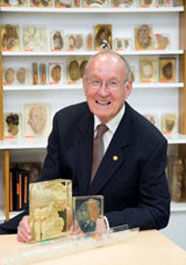 Professor Robin Fraser was interviewed as part of a story about the drink driving limit in New Zealand on TVNZ's Seven Sharp.
Professor Robin Fraser was interviewed as part of a story about the drink driving limit in New Zealand on TVNZ's Seven Sharp.
The legislation to change the blood alcohol limit from 80mg per 100ml of blood to 50mg for drivers over 20 will have its first reading in Parliament before Christmas.
Watch Professor Fraser on Seven Sharp.
September 2013
Genetics Professor interviewed by TVNZ's Seven Sharp
Professor Martin Kennedy was interviewed by TVNZ's Seven Sharp progamme about direct-to-consumer genetic testing and assessed the reporter's genetic test results.
It aired on 24 September as part of Otago Genetics Week.
Watch Martin Kennedy on Seven Sharp.
General Staff Member Awarded for Exceptional Performance
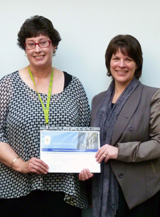 It has been announced that Helen Morrin, Curator of the Cancer Society Tissue Bank is the winner of the 2013 Award for Exceptional Performance by a member of the General Staff.
It has been announced that Helen Morrin, Curator of the Cancer Society Tissue Bank is the winner of the 2013 Award for Exceptional Performance by a member of the General Staff.
Helen has worked for the University for 16 years, and has a unique role as Curator of the Tissue Bank. During her time in this role, Helen has demonstrated a high level of ethical, scientific, personnel, financial and managerial skills which have led to the provision of a world class cancer sample biorepository. She has demonstrated excellence in her field both in New Zealand and internationally and raised awareness of the processes and problems associated with banking human tissue at the University and governmental levels.
This is the first time the Award has been given to someone outside of the Dunedin Campus. Vice-Chancellor Harlene Hayne presented Helen with the award at an afternoon tea award ceremony on 16 September.
July 2013
Pathology PhD student wins UOC 3 Minute Thesis Heat
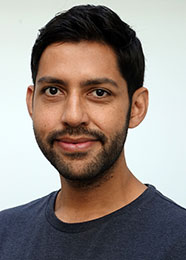 Pathology PhD Student Andrew Das has won the 2013 UOC Heat of the 3 Minute Thesis Competition with his talk, A Radical View.
Pathology PhD Student Andrew Das has won the 2013 UOC Heat of the 3 Minute Thesis Competition with his talk, A Radical View.
Andrew goes through to the next round in Dunedin on 30 August to compete for a spot in the Australasian Finals at the University of Western Sydney in October.
Andrew is undertaking his PhD in the Centre for Free Radical Research under the supervision of Professor Tony Kettle and Professor Christine Winterbourn.
June 2013
Hidden talents of HOD revealed in North and South Magazine
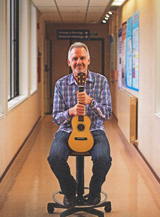 Head of Department Professor David Murdoch features in the July issue of North and South.
Head of Department Professor David Murdoch features in the July issue of North and South.
In the article On a healing note, David discusses his research into the causes of childhood pneumonia with PERCH and also his skills as a luthier, handcrafting guitars and ukuleles.
PERCH (Pneumonia Etiology Research for Child Health) is made up of a international team investigating childhood pneumonia in Kenya, Mali, the Gambia, South Africa, Thailand and Bangladesh and is funded by the Bill and Melinda Gates Foundation.
To date David has made 14 instruments, a number of which have been gifted to his fellow PERCH researchers around the world.
Our Singing Haematology Lecturer
 Senior Lecturer Dr Sean MacPherson turns subjects such as anaemia into catchy medical songs.
Senior Lecturer Dr Sean MacPherson turns subjects such as anaemia into catchy medical songs.
The haematologist composes songs for his lectures to help medical students remember what he is teaching. Lectures cover topics such as anaemia, iron deficiency and exploding red cells.
“The songs are a mnemonic to help the students remember and stop my lectures from getting too boring,” he says.
Sean has been a pianist since he was five and plays the trombone, guitar and mandolin.
He says his songs need to contain humour to be memorable, but he is careful not to be offensive as the subject matter, particularly conditions such as acute leukaemia are no laughing matter.
Check Sean out:
The Singing Lecturer - on TVNZ's Seven Sharp, 4 June 2013
Waxing lyrical in a bid to stir students' blood - The Press article, 27 May 2013
The Anaemia Song - on Youtube
May 2013
Pharmacogenomics Researchers featured on Radio NZ's Our Changing World
 Professor Martin Kennedy and PhD Student Sarah Jodczyk of the Gene Structure and Function Lab featured on Radio New Zealand's Our Changing World series in an article about pharmacogenomics.
Professor Martin Kennedy and PhD Student Sarah Jodczyk of the Gene Structure and Function Lab featured on Radio New Zealand's Our Changing World series in an article about pharmacogenomics.
In the article Martin discusses how scientists are only just beginning to understand how differences in our DNA and our individual genetic make-up impact on both disease and its treatment, and in the recognition of how many genes may be involved in a single disease.
Meanwhile Sarah talks about her research on the differences in chromosome telomere length between people who have been exposed to different kinds and amounts of stress.
The article also features Leon Smyth who was a Summer Student in the lab, his project was looking at the effect of the drug-metabolising enzyme CYP2C19 on the response of individuals to the anti-clotting medication Clopidogrel.
April 2013
Free Radical Researcher featured on Radio NZ's Our Changing World
 Associate Professor Mark Hampton was interviewed for Radio NZ's Our Changing World Series.
Associate Professor Mark Hampton was interviewed for Radio NZ's Our Changing World Series.
In the feature Endogenous Antioxidants, Mark discusses how he is trying to determine how the body's own antioxidants work and how they could be used to treat cancer.
March 2013
Mackenzie Cancer Busters in Relay for Life
The Mackenzie Cancer Research Group put together an enthusiastic team of students, scientists, a clinician and compliant family members to join the Cancer Society's Relay for Life event at Riccarton High School in mid-March.
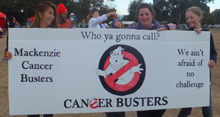 During the 18 hour event one of the 23 members had to be on the track at all times. Most members brought their own tents and stayed over which Dr Gabi Dachs said gave the evening and night a festive atmosphere.
During the 18 hour event one of the 23 members had to be on the track at all times. Most members brought their own tents and stayed over which Dr Gabi Dachs said gave the evening and night a festive atmosphere.
“In contrast, the start and candle light ceremony were much more sombre and emotional. The track looked great lined with many individually decorated candle bags. Seeing 'I miss you mum', or similar, really brought home the idea of why we were doing this.”
The team managed to raise in excess of $2800. The Cancer Society holds the event at different venues around New Zealand and estimates that over $35,000 was raised at the Riccarton event. This money will be used to support cancer sufferers, carers and research.
New research into optimal vitamin C intake from the Centre for Free Radical Research
 A daily vitamin C intake equivalent to eating two kiwifruit a day is required to ensure our muscles maintain optimal levels, researchers from the Centre for Free Radical Research have found.
A daily vitamin C intake equivalent to eating two kiwifruit a day is required to ensure our muscles maintain optimal levels, researchers from the Centre for Free Radical Research have found.
Professor Margreet Vissers and her team in the Centre for Free Radical Research are involved in a large on-going study to better understand the critical role of vitamin C in the human body. They are also investigating the best way to obtain the vitamin from the diet.
Their paper on the uptake of vitamin C into muscle has just been published in the American Journal of Clinical Nutrition, the most prestigious publication in the field of nutrition science.
Margreet also features t in the March 2013 edition of Consumer magazine in the article Bitter pills - antioxidant supplements, and appeared on the TVNZ Sunday show on 24 March..
February 2013
UOC's Gold Medal for Research Excellence awarded to HOD
 Congratulations to Head of Department, Professor David Murdoch for receiving the UOC Gold Medal for Research Excellence.
Congratulations to Head of Department, Professor David Murdoch for receiving the UOC Gold Medal for Research Excellence.
David was awarded the medal during the UOC's Fortieth Anniversary Celebration Dinner at Wigram Airbase.
2013 BBiomedSc(Hons) Students begin
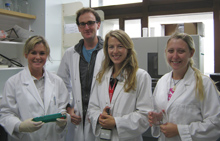 The Department warmly welcomes the four students enrolled in the Bachelor of Biomedical Sciences with Honours course for 2013.
The Department warmly welcomes the four students enrolled in the Bachelor of Biomedical Sciences with Honours course for 2013.
Zac Gerring, Annika Seddon and Teresa Flett are all doing projects with supervisors in the Mackenzie Cancer Research Group.
While Kate Vick is doing her project under the supervision of Associate Professor Mark Hampton in the Centre for Free Radical Research.
January 2013
Visitors at the Centre for Free Radical Research
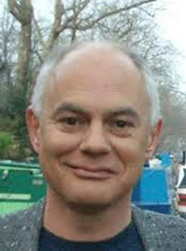 The New Year begins with the Centre of Free Radical Research hosting 3 visitors.
The New Year begins with the Centre of Free Radical Research hosting 3 visitors.
Professor Guy Salvesen (pictured) has joined the Department for 6 months on sabbatical from the Sanford-Burnham Institute in California, USA and Professor Terry Kavanaugh is visiting from Department of Environmental and Occupational Health Sciences, University of Washington, USA.
The Centre also has a visiting PhD student, Marjolein Soethoudt who will be studying at the Centre for 6 months.
